Spring 2020 eNewsletter
SPOTLIGHT: 2020 Great Lakes Summer Fellows go Virtual!
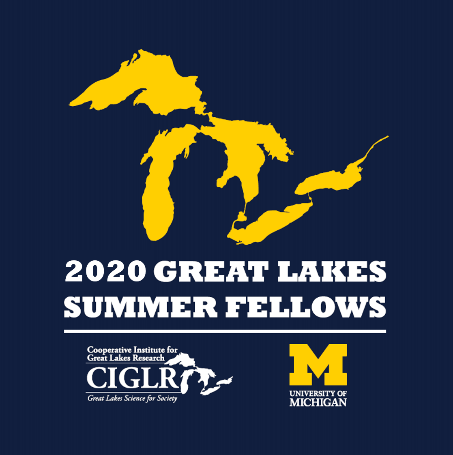 Among the many challenges we face at CIGLR this year in the COVID-19 landscape is how to carry out our career training mission in a safe, yet meaningful way. In partnership with NOAA GLERL, the Great Lakes Summer Fellows Program is the cornerstone of our efforts to train the next generation of scientists. Each year CIGLR has the pleasure of hosting a group of bright, upcoming scientists to participate in a 12-week fellowship that exposes them to an in-depth research project. These projects typically include computer-based modeling, marine engineering, field research, and laboratory analyses. Translating this hands-on research to our new hands-off world was the monumental task given to the 21 mentors from CIGLR, GLERL, and The Ohio State University (a CIGLR Consortium institution) who volunteered to guide the 8 students accepted to the 2020 fellowship program. Over the course of a few short weeks, these dedicated mentors adapted their research projects to a virtual format by developing new and relevant research questions, overcoming critical IT obstacles, and preparing for remote interaction.
Among the many challenges we face at CIGLR this year in the COVID-19 landscape is how to carry out our career training mission in a safe, yet meaningful way. In partnership with NOAA GLERL, the Great Lakes Summer Fellows Program is the cornerstone of our efforts to train the next generation of scientists. Each year CIGLR has the pleasure of hosting a group of bright, upcoming scientists to participate in a 12-week fellowship that exposes them to an in-depth research project. These projects typically include computer-based modeling, marine engineering, field research, and laboratory analyses. Translating this hands-on research to our new hands-off world was the monumental task given to the 21 mentors from CIGLR, GLERL, and The Ohio State University (a CIGLR Consortium institution) who volunteered to guide the 8 students accepted to the 2020 fellowship program. Over the course of a few short weeks, these dedicated mentors adapted their research projects to a virtual format by developing new and relevant research questions, overcoming critical IT obstacles, and preparing for remote interaction.
While the fellowship mentors made adjustments to their research plans, the CIGLR ECO (Engagement, Career Training, and Outreach) team translated the career preparation and team-building aspects of the program to a virtual format. In a typical year, these activities include weekly seminars on career development topics and many opportunities for networking, both as a fellows cohort and more broadly with the staff and students of CIGLR, GLERL, and other in-house partners working at the laboratory. Moving the seminars to a virtual platform was an easy modification, but replicating the social aspects of the program, which are always reported among the most valuable parts of fellows’ experiences, proved to be a greater challenge. To help give the fellows exposure to the many dynamic individuals in our collaborative environment, the weekly virtual career development seminars are being complemented by weekly virtual research discussions, where fellows have the opportunity to hear from CIGLR and GLERL scientists about their work and their own career paths. The fellows are also participating in virtual social hour gatherings, trivia nights, and a book club focused on diversity and inclusion topics.
Despite the less-than-ideal circumstances, the fellows, mentors, and ECO team have truly demonstrated just how much can be accomplished in a virtual fellowship. We applaud everyone involved for their flexibility, creativity, and positivity that are shaping a meaningful, career-building experience out of a challenging situation.
We offer an enthusiastic welcome to the 2020 Great Lakes Summer Fellows:
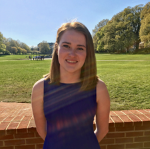
Brenna Friday
Brenna is working with Dr. Michael Fraker (CIGLR) to identify climatic influences on antipredator phenotypic plasticity in larval amphibians to clarify how the structure and function of many ecosystems will be impacted by future aquatic conditions. She is currently pursuing her doctorate at Wayne State University.

Chanse Ford
Chanse is mentored by Lacey Mason (GLERL), Lindsay Fitzpatrick (CIGLR), and Drs. Brent Lofgren (GLERL), Lauren Fry (GLERL), and Yao Hu (formerly CIGLR, currently University of Delaware). He is evaluating the next generation runoff risk tools that will help farmers determine the best time to apply fertilizers based on weather forecasts and soil moisture conditions. Chanse is currently pursuing his doctorate at Michigan State University.
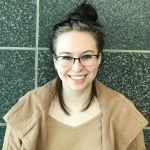
Kaylin Jones
Kaylin is currently pursuing her doctorate at the University of Michigan. She is working with Drs. Yi Hong (CIGLR) and Eric Anderson (GLERL) to study flood resilience in Great Lakes coastal regions by using numerical models to predict flood risks in different zones under climate change.
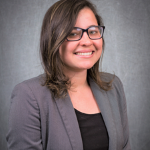
Lorrayne Miralha
Lorrayne is mentored by Drs. Regan Errera (GLERL) and James Hood (Ohio State University). She is investigating the environmental mechanisms influencing seasonal progression of phytoplankton in the western basin of Lake Erie from spring-fall of 2019. Currently, Lorrayne is pursuing her doctorate at Arizona State University.
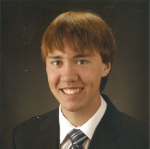
Drew Reiser
Drew is working with Drs. Jia Wang (GLERL), Philip Chu (GLERL), and Ayumi Fujisaki-Manome (CIGLR) to analyze and predict ice cover and thickness in the Great Lakes and the Arctic in response to a changing climate on seasonal, interannual, and decadal time scales. Drew is a senior studying at the University of Illinois at Urbana-Champaign.
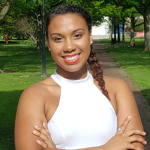
Kaitlyn Rivers
Kaitlyn graduated with her bachelor’s degree in May from Oberlin College. She is working with David Wells (CIGLR) and Drs. Doran Mason (GLERL), Ed Rutherford (GLERL) and Hank Vanderploeg (GLERL) to investigate bottlenecks to fish larvae growth, survival and potential recruitment in Lake Michigan.

Anisha Shrestha
Anisha is currently pursuing her master’s degree at Grand Valley State University. She is working with Russ Miller (CIGLR) and Dr. Michael Fraker (CIGLR) to identify patterns in Great Lakes environmental data collected by an underwater glider.

Kaelan Weiss
Kaelan is working with James Kessler (GLERL) and Drs. Dmitry Beletsky (CIGLR) and Dan Titze (CIGLR). He is working to improve water level forecasts in the Lake Champlain basin by assessing the accuracy, or skill, of operational atmospheric models that are critical for improving water level predictions in the basin. Kaelan graduated with his bachelor’s degree in May from the University of Minnesota – Duluth.
